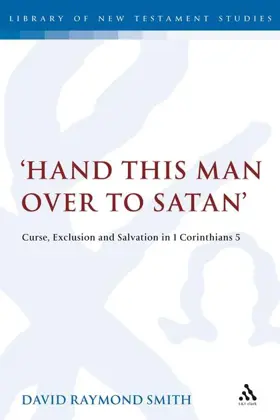

'Hand this man over to Satan': Curse, Exclusion and Salvation in 1 Corinthians 5
in Library of New Testament Studies
Pages
224
Publisher
T&T Clark
Published
6/13/2009
ISBN-13
9780567033871
1 Corinthians 5:5 is a curious passage which has been variously interpreted by scholars. For some, it denotes a magical curse which is designed to cause the physical death of the sinner. Others have found such an interpretation unpersuasive. Instead, they maintain that Paul's words at verse five are to be understood as a metaphor for exclusion from the Corinthian community. So, the errant Corinthian is not to die by a curse, but is to be excluded.
This work argues for the former interpretation by marshaling a range of the most recent-specialized-magical material, which has not been considered by other works in relation to 1 Corinthians 5. It fully acknowledges the weaknesses of previous magical interpretations, and metaphorical approaches to the passage. Instead, it presents a fresh magical reading of not only 1 Corinthians 5:5, but the whole of 1 Corinthians 5-within its wider context of the apostle Paul's letter to the Corinthians.
This work argues for the former interpretation by marshaling a range of the most recent-specialized-magical material, which has not been considered by other works in relation to 1 Corinthians 5. It fully acknowledges the weaknesses of previous magical interpretations, and metaphorical approaches to the passage. Instead, it presents a fresh magical reading of not only 1 Corinthians 5:5, but the whole of 1 Corinthians 5-within its wider context of the apostle Paul's letter to the Corinthians.
- Table of contents
- Introduction
- Part one: 1 Corinthians 5:5: A Critical Reception History: this section considers previous interpretations of 1 Corinthians 5:5 and assesses these arguments for their strengths and weaknesses.
- Part two: Jewish and Graeco-Roman Traditions of ('Binding') Cursing: part two offers a broad examination of Jewish and Graeco-Roman traditions of magic and cursing in order to demonstrate the common practice of magic and cursing in the apostle Paul's cultural milieu.
- Part three: The Curse Interpretation-Reformulated: this section draws upon the previous two parts to offer a fresh interpretation of 1 Corinthians 5, avoiding the pitfalls of previous interpreters and drawing upon fresh material (considered in the previous part [two]).
- Conclusion
- Bibliography